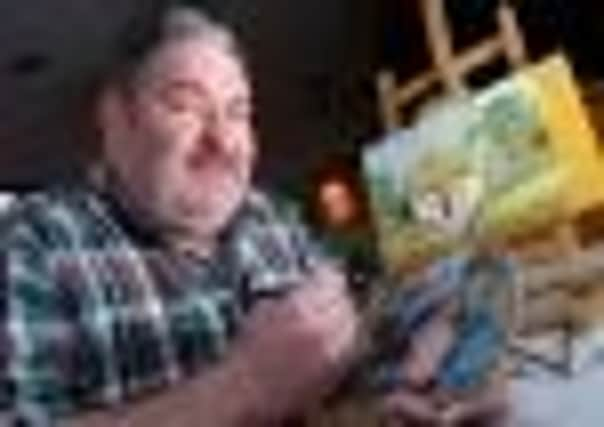Living with a brain injury – David’s story


At just 35, the council manager lost his sight, his ability to walk and even his ability to talk.
He spent nine days in a coma, months in intensive and rehabilitation care, and seven years on, still suffers from the effects of the tonic-clonic seizure brought on by a brain injury.
Advertisement
Hide AdAdvertisement
Hide AdDespite this the 41 year-old has been able to turn his condition into inspiration by raising awareness of those living with brain injury.
After overcoming temporary blindness and learning to walk and talk again, David found support through a local charity aimed at improving care and help for those who have suffered a brain injury.
“I decided to speak out more on the condition because it became obvious to me that there were so many people living within the Mid-Ulster with a brain injury, who are not receiving the help and support they need,” David told the MAIL.
“A lot of our members are very reserved, they aren’t as far on the path to recovery as me yet to speak publicly about their condition. Brain injury can be a very lonely and isolating experience.”
Advertisement
Hide AdAdvertisement
Hide AdHe has since held many events in the Cookstown area in an effort to raise funds for Headway, the charity which has helped him and many others through the many obstacles and effects of living with a brain injury.
“I was 35 when I suffered a clonic-tonic epileptic seizure, or a grand-mal seizure as it is more commonly known. I had no history of epilepsy before that but I did have a knock on the head sometime before,” said David.
“I spent nine days in a coma in the Royal and when I woke up I spent a futher three to four months in a specialised intensive care room. After that I had to learn to walk and talk again with the help of occupational therapists.”
It was during this time that David became aware of Headway, Ballymena and the help that was available.
Advertisement
Hide AdAdvertisement
Hide AdThe Stewartstown man became involved with the local branch which offers a wide range of services, including rehabilitation programmes, community outreach and respite care, and also campaigns for better services for those living with the condition in Mid-Ulster and beyond. David also hopes to set up a Headway office in Cookstown in the near future.
“The needs of people with brain injury don’t just stop because there’s a recession or a public holiday,” adds David.
“As healthcare budgets continue to be cut, people with brain injury and epilepsy need to be supported and represented more than ever.”
“The first thing people with brain injury need is specialist healthcare. A phenomenal third of people are misdiagnosed with epilepsy, a major complication of brain injury.
Advertisement
Hide AdAdvertisement
Hide Ad“Anti-epileptic drugs (AED’s) have very harsh side effects including memory loss and depression. Many of these difficulties with diagnosis and treatments can take several years to treat successfully.”
David hopes that by raising awareness of his condition working through Headway that many other people, who often become depressed and isolated after suffering a brain injury because of its colossal side effects and symptoms, can come forward and receive the help they need.
“I have my good days and my bad,” adds David.
“Today when talking to the Mid-Ulster Mail has been a good day, but I will go home now and sleep because simple things like this take so much out of me.
“Fatigue is a common symptom with a brain injury. Many patients often sleep 14, 16 or 18 hours per day when recovering from brain injury and can lose three plus years of life excluding the time spent in hospital in a coma.
Advertisement
Hide AdAdvertisement
Hide Ad“Just working at a computer or being in a busy environment such as a shop can bring it on.
“And this level of fatigue often results in loss of work, employment, a person’s driving licence, identity and can contribute to people becoming severely isolated,”
David has learned to the manage the effects of his condition and has received unrivalling support from local businesses and the public for his work with the charity. His latest fundraiser will be this month, a Coffee Morning on Saturday March 24th at Brigh Presbyterian Church Hall in Stewartstown from 10am to 12 noon.
“There are so many people living in the Cookstown area who are perhaps not as far down the road as me with receiving the help and support they need. But hopefully by raising awareness we can change that.
Advertisement
Hide AdAdvertisement
Hide Ad“Working together we will get better healthcare, more information and more public awareness of brain injury.”
Gail Workman, Chairperson of Headway’s Ballymena branch.
“Headway is a voluntary charity which supports and cares for people with a brain injury and provides help to relatives of those with a brain injury.
“We meet on the first Wednesday of every month in Ballymena; we also provide a 24 hour helpline, available on 028 25651521 for those who need a chat or information.
“Headway provides information and booklets on brain injury free of charge. All our funding goes towards supporting those living with a brain injury, we have an annual trip every year and this year we will take our members to Bath.
Advertisement
Hide AdAdvertisement
Hide Ad“These outings are important as with a brain injury many people experience a personality change and this helps them come out of themselves and make friends. Therefore our funds are vital.”
Headway Ballymena, 111 Lettercreeve, Ballymena can be contacted on 028 2565 1521 or log onto www.headway.org.uk/Branches/ballymena for more information.